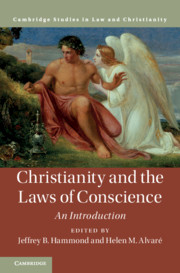Book contents
- Christianity and the Laws of Conscience
- Law and Christianity
- Christianity and the Laws of Conscience
- Copyright page
- Dedication
- Contents
- Contributors
- Acknowledgments
- Introduction
- Part I Themes in Understandings of Conscience in Christianity
- Part II Conscience According to Major Figures and Traditions
- 5 Conscience in the Early Church Fathers
- 6 St. Thomas Aquinas on Conscience
- 7 Reforming the Conscience
- 8 Toward a Theology of a Redeemed Conscience
- 9 Pierre Bayle
- 10 Freedom of Conscience and Its Right to Constitutional Protection
- 11 Jonathan Edwards on Conscience
- 12 Obeying God Rather Than Men
- 13 Mormonism and Conscience
- 14 Culture and Conscience in the Thought of Joseph Ratzinger, Pope Benedict XVI
- Part III Applied Topics in Law and Conscience
- Index
- References
6 - St. Thomas Aquinas on Conscience
from Part II - Conscience According to Major Figures and Traditions
Published online by Cambridge University Press: 12 June 2021
- Christianity and the Laws of Conscience
- Law and Christianity
- Christianity and the Laws of Conscience
- Copyright page
- Dedication
- Contents
- Contributors
- Acknowledgments
- Introduction
- Part I Themes in Understandings of Conscience in Christianity
- Part II Conscience According to Major Figures and Traditions
- 5 Conscience in the Early Church Fathers
- 6 St. Thomas Aquinas on Conscience
- 7 Reforming the Conscience
- 8 Toward a Theology of a Redeemed Conscience
- 9 Pierre Bayle
- 10 Freedom of Conscience and Its Right to Constitutional Protection
- 11 Jonathan Edwards on Conscience
- 12 Obeying God Rather Than Men
- 13 Mormonism and Conscience
- 14 Culture and Conscience in the Thought of Joseph Ratzinger, Pope Benedict XVI
- Part III Applied Topics in Law and Conscience
- Index
- References
Summary
Cajetan Cuddy looks at conscience through the thought of St. Thomas Aquinas. Conscience is an act of ordering knowledge – some universal and some particular – to an act, whether past, present, or future. Conscience directs future acts, and regarding past acts, can accuse or excuse. Aquinas compares conscience and synderesis – the person’s inclination shaping her understanding. Synderesis turns human nature to good and objects to evil. It gives awareness of the principles of morality to be applied to actions. Synderesis concerns knowing the principles applicable to all actions, and conscience applies knowledge to a specific act. Thus, conscience comes from synderesis. But conscience has limits and can be wrong and need correction. A mistaken conscience does not stop a person’s orientation to the truth, and error can be fixed. Conscience and God’s law both bind for Aquinas, not because conscience is perfect or reason is independent of the law, but because conscience mediates God’s norms to humans doing a particular action. This is done through the application of synderesis, which is always ordered to moral truth, meaning to God.
Keywords
- Type
- Chapter
- Information
- Christianity and the Laws of ConscienceAn Introduction, pp. 112 - 131Publisher: Cambridge University PressPrint publication year: 2021



